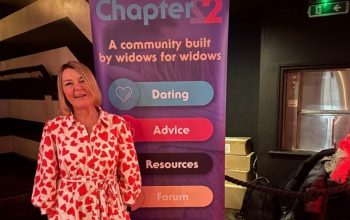 Keith Hern only understood how grave his situation was when the doctor told him on the phone to come to the hospital immediately. The results of his biopsy were in and the urgency in the doctor‘s voice could only mean one thing:
Keith Hern only understood how grave his situation was when the doctor told him on the phone to come to the hospital immediately. The results of his biopsy were in and the urgency in the doctor‘s voice could only mean one thing:
Keith had just been diagnosed with cancer.
When doctors found cancer cells in his system in 2010 they told him there was no debate about his next step. The only thing they could do was to cut out one of his lungs. For Keith this was not an option. “People survive these things by other means. I doubled up on the yoga,” he says.
Keith’s history with cancer started in 2007 when he was told he had a tumour in his throat. After weeks of aggressive chemotherapy the tumour was gone but just two years later the cancer returned. This time it was in his chest and this time it was serious. Once again, Keith survived and walked out of the hospital in reasonable good health a few months later.
It was not over yet, Keith got another diagnosis. The cancer cells were in his lung now and had spread so widely that it left the doctors with no other option than to cut it out.
Keith soon realised that he didn‘t like the idea of leaving it to traditional medicine whether he would live or not. The odds were as bad as they could be as his doctor told him his chances of walking out of it alive were between 10 and 40 per cent.
“When I decided against the surgery everybody called me mad.” People couldn‘t believe that in a situation as serious as this, Keith would start to experiment with alternative approaches. He had started working with a nutrionist and complemented his traditional medical treatment with healthy food, yoga, magnet therapy and most important: Neuro-linguistic programming (NLP).
NLP is a therapy approach that believes in a connection between mind, language and behaviour. “After the first diagnosis it was really important for me to work with the NLP coach because it is so traumatic when you are diagnosed.
“When I got the second diagnosis I thought: ‘How dare you? But you have done it before, you can do it again’. But this time I just thought: ‘For God‘s sake! Why?’
“You get down moments when you think: Will I be alive next this time next year? But then you go: ‘Come on, get moving.'”
Keith started to blog about his disease and posted photos of his first radiotherapy sessions. One picture on his website jumps out particularly. It shows Keith and his daughter crossing the street. Keith is wearing a hospital bracelet and drags his chemo machine along behind him.
“I got friendly with the guy who ran the coffeshop over the road so I went there with my chemo machine,” Keith says. But when he came back to the hospital a nurse was already waiting for him. She said: “Were you just in the cafe with your chemo machine? Do you have any idea how poisonous that stuff is? If you spill even a little bit, we have to evacuate the building. You could use it for chemical warfare.” Keith was stunned. This was the substance they were putting into his body 24/7.
In the meantime Keith‘s cancer blog became popular among people in his situation so he eventually decided to write a book on it. He sold a couple of them and soon got testimonials. One woman wrote: “Keith, without your book I would never have survived.” Inspired by the positive reactions he started to talk about his disease on public events.
Somewhere along the way Keith made friends with Patricia Peat, a former oncology nurse, who got fed up with the medical world and now runs a consultancy firm called Cancer Options. She offers advice with all kinds of orthodox treatments, clinical trials and other new developments around the world. She also does consultancy on how compatible certain kinds of alternative medicine are with chemotherapy and radiotherapy.
She says: “After many years as an oncology nurse I saw the need for people to have access to good quality information about all approaches to treatment so they could take charge of their cancer decisions.”
Both Mrs Peat and Keith Hern agree that the medical approach doesn‘t work equally well for everyone. “For some people it works, for others it doesn‘t work at all and for others it kind of works. There are alternative appraoches out there, so why don‘t we have the opportunity to integrate it? It‘s natural so it‘s not going to do any damage,” Keith says.
Aside from his book and his public talks called “Turning adversity into opportunity” Keith also appears on the local health radio show of his nutritionist. On the programme he talks to other people on how they coped with cancer.
“I interviewed an American guy who is one of the – if not the longest – survivors of lung cancer. It has been 39 years since the medics told him he had only 6 months to live. His solution was diet, exercise and spirituality. No chemo at all.
“There are plenty of cases out there about people who get through it. But there is a whole other story why you don‘t hear about them. The pharmaceutical companies just don‘t want us to.”
But Keith‘s goal is not to put other people off from chemotherapy. In his talks he emphasizes the the importance of positive thinking. “I don‘t focus on the treatment. I focus on the medical side. There is no way you can make recommendations. It doesn‘t work for other people the way it works for you,” he says.
So how has his life changed?
“The cancer makes you aware of your mortality. My wife and I wanted to rent this place out and travel down all the West coast of America. Now I can‘t do that.
“But I like doing the radio show. What‘s after that? Maybe nothing. For now all I want is to find a way to get through this and make sure it doesn‘t come back anymore. Then I can go on with the rest of my life.
“How do I do that? I don‘t know yet. If the chemo does it’s job then I have a bit more time to work on it. Maybe the chemo is so horrible that I have to take myself off it. The future is uncertain.”
Photo courtesy of Keith Hern




